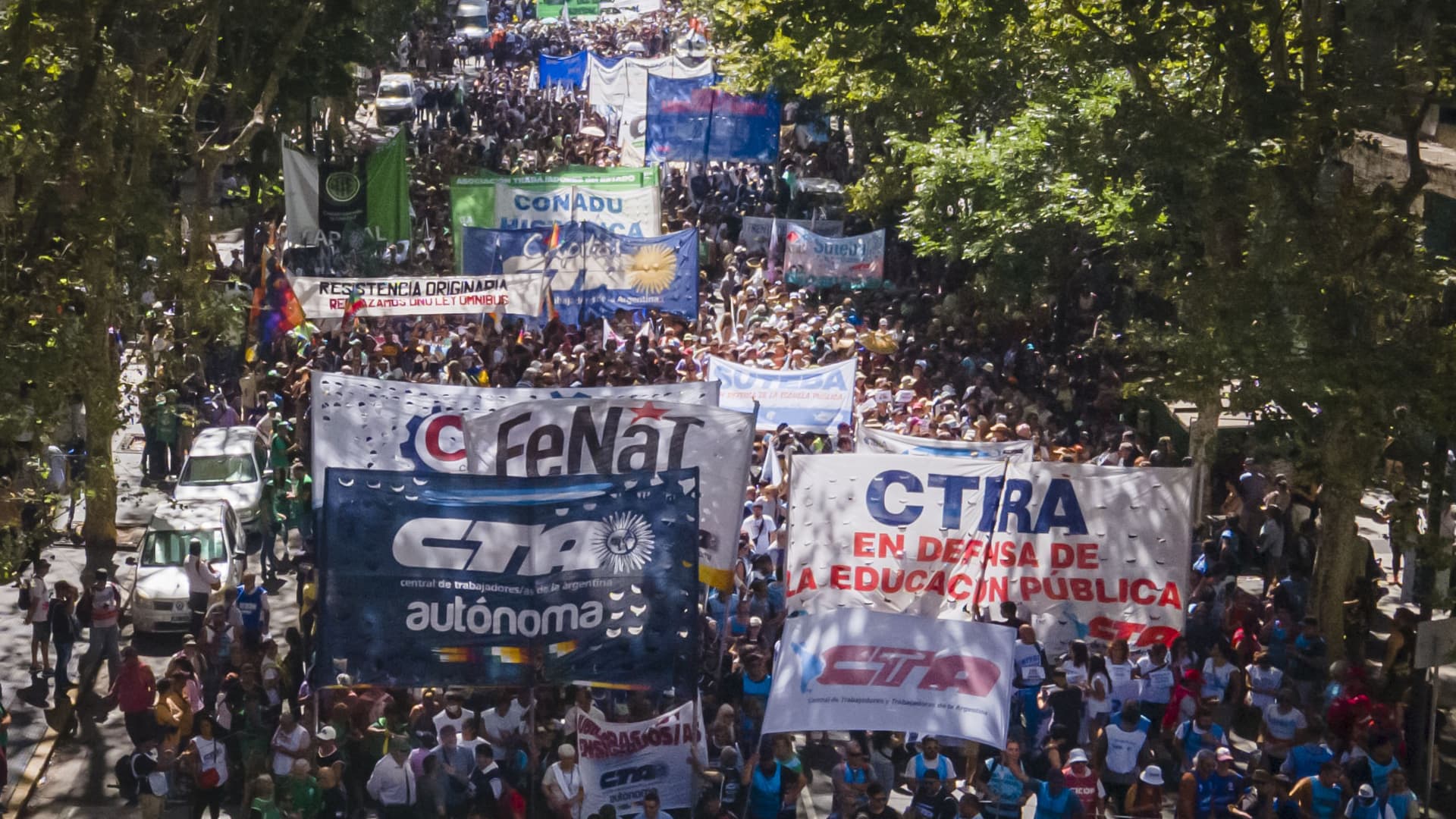A nationwide strike in Argentina poses major test to Milei’s economic ‘shock therapy’
[ad_1]
Protesters march during a national strike against policies of President Javier Milei called by worker’s union CGT on January 24, 2024 in Buenos Aires, Argentina.
Marcelo Endelli | Getty Images
Argentina’s largest labor union grouping on Wednesday held a nationwide general strike to protest President Javier Milei’s shock economic agenda.
The strike comes just 45 days after the right-wing leader took office, making it the fastest action of its kind into the term of a new Argentina government.
Thousands of workers took to the streets after a mobilization called by the opposition aligned Confederación General del Trabajo (CGT), the largest and most influential union in the country, and other union forces.
The strike represents a significant test for Milei, who has announced sweeping measures to deregulate Latin America’s third-largest economy.
Analysts said the general strike was unlikely to have a significant impact on Milei’s policies in the near term but warned the potential for the labor union’s movement to grow in both size and potency could become a serious disruptor of economic activity.
Argentina’s government has not responded favorably to the strike action. Milei’s administration has reportedly said it will dock a day’s pay from each striking public servant, and established an anonymous toll-free line for people to report “threats and pressure” on workers to stay away from their jobs.
“The general strike is more of a political test for the labour unions than for Milei,” Jimena Blanco, head of Americas at risk consultancy Verisk Maplecroft, told CNBC via email.
“Regardless of attendance, the strike caters to the unions’ own support base and, at this stage, is not representative of wider social sentiment. However, it has the potential to grow in the future as the impacts of the economic shock plan become palpable.”
Javier Milei, Argentina’s president, during a special address on day two of the World Economic Forum (WEF) in Davos, Switzerland, on Wednesday, Jan. 17, 2024.
Bloomberg | Bloomberg | Getty Images
Blanco said history shows that during Argentina’s hyperinflation crisis in the late 1980s, the Peronist-aligned unions held 13 strikes, eventually bringing an early end to the Raúl Alfonsín’s government.
“And while we do not expect the pursuit of a similar strategy, the relentless use of labour action to pressure the executive means mobilisations could become a serious disruptor of economic activity and suppress potential investor appetite, particularly if they turn violent and result in the damage of assets,” she added.
The left-leaning Peronist movement was founded by Juan Peron, who first became president in 1946. Peronist candidate Sergio Massa conceded defeat to Milei in the country’s presidential run-off late last year.
Economic crisis
Argentina is once again in the grip of a profound economic crisis.
The purchasing power of Argentinians has been ravaged by an annual inflation rate of more than 211%, its highest level in 32 years, while two in five citizens now live in poverty after decades of financial mismanagement.
Milei has said there is no alternative to his proposed “shock therapy” to remedy the situation. He has announced plans to dollarize the economy, abolish the country’s central bank and privatize the pension system.
Last week, Argentina’s libertarian president called on business and political leaders to reject socialism and instead embrace “free enterprise capitalism” to bring an end to world poverty.
Protesters march during a national strike against policies of President Javier Milei called by worker’s union CGT on January 24, 2024 in Buenos Aires, Argentina.
Marcelo Endelli | Getty Images
Nicolas Saldias, senior analyst for Latin America at the Economist Intelligence Unit, said the unwillingness of the highly partisan unions to call a strike during the last administration had likely sapped their credibility with the wider public.
“As a result, I think that many Argentinians will not interpret the strike favourably as it is too soon and the union leaders are extremely unpopular with the wider public,” Saldias told CNBC via email.
“The government was wise to leverage its honeymoon period to fast-track its reforms and it is making important progress on its legislative agenda as there is still goodwill among non-Peronist parties,” he added.
However, Saldias said that if the economy fails to recover quickly enough, subsequent strikes could have more of an impact on Milei’s agenda.
[ad_2]
This article was originally published by a Cnbc.com. Read the Original article here. .






